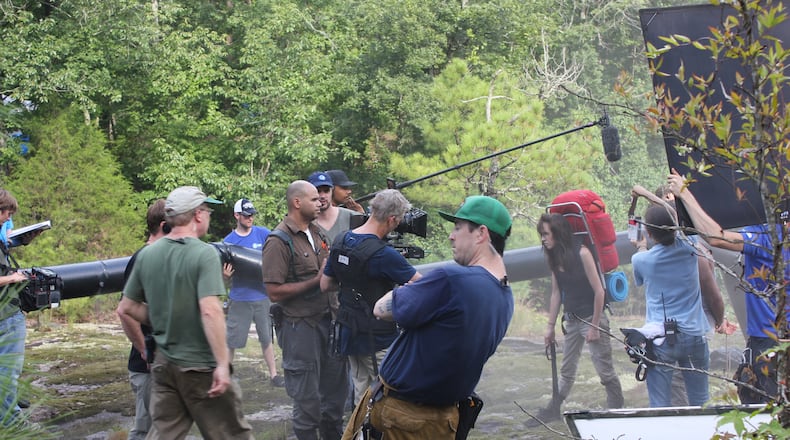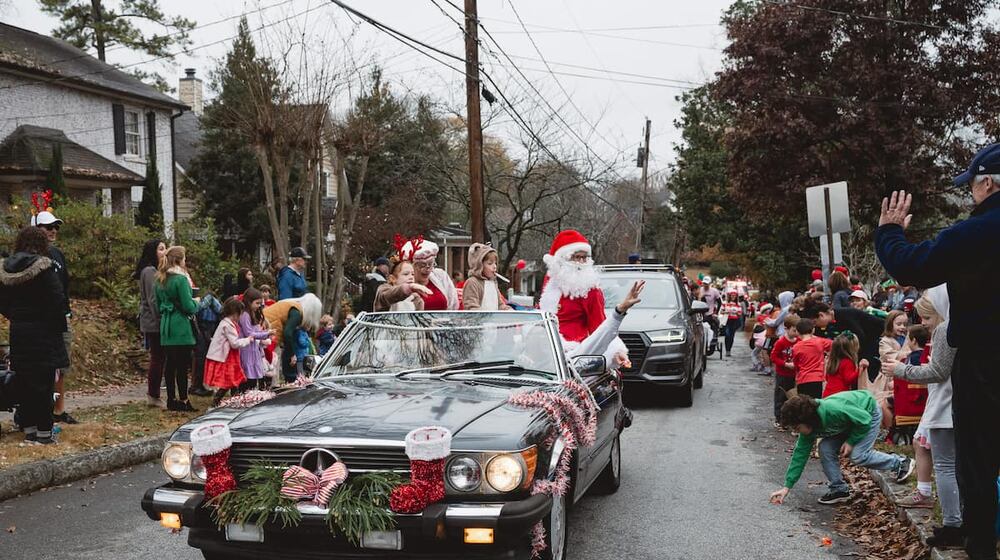When Georgia filmmaker Eric Blue set out to make his first independent feature film he knew he wanted to tap into the resources that are available to local filmmakers.
Blue had been making short films in Georgia for years and found that many of the people he’d worked with in the past were now well-known and respected within the film industry. For instance, he made a short film with actress Melissa McBride before she became famous for her role on “The Walking Dead.”
When it came time to make “Beacon Point,” Blue found it easy to tap into the network he’d created in hopes of making the best possible film on an independent budget.
The film follows Zoe and a group of hikers as they embark on a 10-day trip through the Great Smoky Mountains. Of course, things don’t go as planned for the characters in the horror film.
For local horror fans who are seeking a dose of freight after Halloween, the sci-fi thriller will be showing at the Plaza Theatre for one week starting Nov. 4.
We spoke with Blue about the film and his love for the Georgia film scene ahead of the film’s premiere:
What’s the hardest part of making an independent feature film?
“The two hardest parts are raising the money and selling the film. The filmmaking is the fun part.”
You’ve worked with “The Walking Dead” actress Melissa McBride before making this film? What was that like?
"We worked on a movie called "Lost Crossing." It was a 25-minute short film. We did a casting and a friend of mine introduced me to her. This was way before 'The Walking Dead.' I guess I was lucky to meet her. She was in my Kickstarter video to raise money for [Beacon Point]. It was great having her stamp of approval because she has so many fans. She's really cool and she's a super sweet woman. And she's been a big supporter of ours."
You raised $24,000 in 45 days during that Kickstarter campaign. What was that money used for?
“That money was raised specifically for doing final touches on the movie and marketing costs. When we did [the campaign] the movie was pretty much done. We needed a little extra money to do the final things.”
How did you leverage local resources and film crews to make this film?
“A lot of the people that I worked with [on this film] I’ve been working with for a long time and they’ve come up through the ranks as Georgia has become more of a film city. I was lucky enough to make this network of friends and partners that I’ve been able to work on this movie with.”
Was it hard to get the quality you wanted in terms of a crew and production on an indie budget?
We’ve been very fortunate to have a lot of the same resources that some of these big movies have. The good news is I know these people really well and they [understood] where I’m coming from in terms of what budget I had. We were able to do a lot with a little. I think we were more efficient in some ways. We didn’t have some of the luxuries that some of the big films had, but we were a little more nimble. People were willing to work for a little bit less for what they thought was a quality project with a local filmmaker.
You take a lot of pride in being a Georgia filmmaker. Why is that?
“I love Atlanta and we want to continue to reap the rewards of being here. There’s a great tax incentive, cast and crew, and, quite frankly, I think you can make a movie in Atlanta cheaper than you could in the other major movie-making cities. And I’m getting top notch cast and crew and resources.
“We’re really proud to be Georgia filmmakers. That’s something I wave high. We were doing this when there weren’t a lot of films here and to see it happening now we’re really happy. We’re reaping the benefits now.”
This film was loosely based on a camping trip you had with your then-girlfriend. Tell me about that:
“She’s now my wife, by the way. As a director and writer you’re thinking about what’s going to be an interesting story so you tap into those natural experiences. We had this camping experience and we were all alone and we’re hearing sounds out of the woods at night. I didn’t think about it for years and years [until] I wanted to write a scary movie that was fun and suspenseful.”
In the press release, you talk about how intentional it was that Zoe is a strong female lead. Was she directly inspired by your wife?
“In a lot of ways, yeah. She’s an amazing woman so there was definitely an influence. I was so tired of the ‘damsel in distress’ story. A part of it was breaking [a film] cliché. Instead of a man saving the woman, what if the woman saves the guy? I wanted to tell a story where we broke the mold and had a strong female character.”
Most of the film was shot in Georgia, including on private property that has a waterfall. How did you find that property?
“I just did a lot of research. [I used] Google Earth and zoomed down. It was detective work to find it. I contacted the owners of the land and they liked the idea and they invited us out. I think we were on their property for like a week.
“So many waterfalls are in state parks and on federal land and it’s so hard to get permission so we kind of gave up on that. But it’s really hard to find a private waterfall. I found one of the most amazing waterfalls I’ve ever seen.”
You also shot at the Georgia International Horse Park in Conyers. What was that like?
“I’d shot a short film there [before]. They are super nice and very helpful. I highly recommend shooting there. The one ‘gotcha’ was when the wind is blowing a certain way the air traffic to Hartsfield changes. There were planes flying over constantly.”
Why did you decide to shoot there instead of in the mountains where the film is set?
“We had to bring trucks and lights and be able to set up generators. This just made more sense logistically. We were able to fake it pretty well. [It’s] close enough that I don’t think people can tell the difference.”
You did shoot some of the film in the Great Smoky Mountains, right?
“Some things you just can’t fake. You want to really set the tone. That’s part of the whole story. They’re away from civilization and these bad things are happening.”





